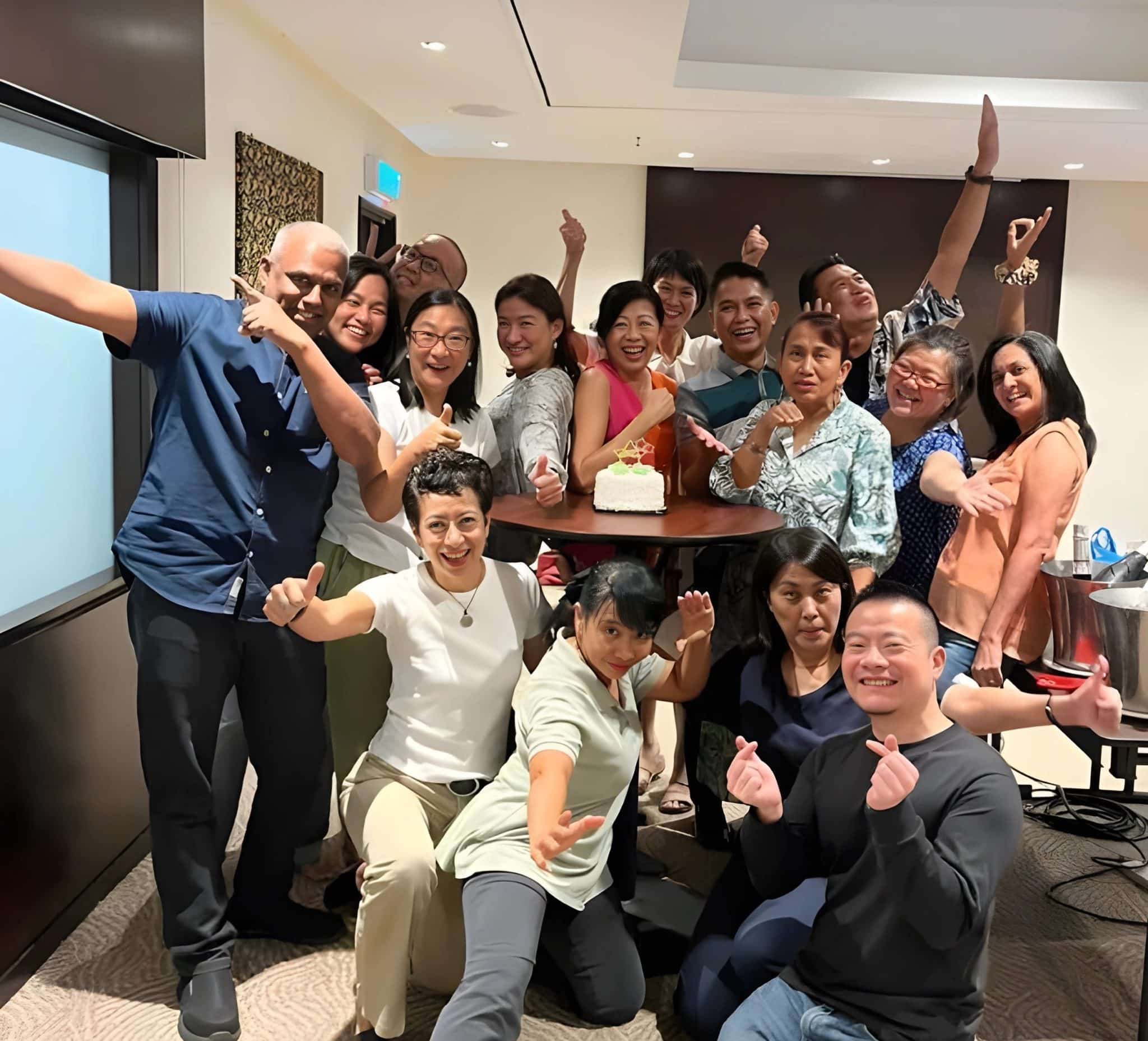How do leaders lead with clarity when things go wrong?
Reverend Abel Cheah, via Alpha Asia Pacific // November 24, 2022, 12:46 am

"Have you noticed how positive and hopeful people are excellent problem-solvers?" asks Abel Cheah. "Leaders who lead with hope believe that when things fall apart, God can make them fall into place." Photo by Yosep Surahman on Unsplash.
Throughout history, civilisations have risen and fallen based on violence and power. Wars were waged by mighty men who claimed what didn’t belong to them and abandoned what did. New kingdoms were established by tearing apart and breaking down others.
How do we lead when the things around us go wrong?
Speaking to churches struggling with disunity and a team breaking down, Paul in 1 Corinthians writes a manual for how to lead in times of brokenness. In fact, this is a manual for how to live like Christ: First, Paul defines what love is, and then he concludes by saying: “And now these three remain: faith, hope and love. But the greatest of these is love.” (1 Corinthians 13:13)
In 1 Thessalonians 1:3, Paul fleshes out what faith, hope, and love do to us. In encouraging the church, he says: “We remember before our God and Father – your work produced by faith; your labor prompted by love; and your endurance inspired by hope – in our Lord Jesus Christ.”
At the beginning of Jesus’ ministry, He announced the arrival of a different kingdom. This would be a kingdom that would never end: it would be God’s rescue operation for a world of brokenness and division. In one of his opening remarks, Jesus declared these shocking words: “blessed are the brokenhearted, for they shall be comforted”.
Later on, He would declare: “I am the way, and the truth and the life” (John 14:6).
Jesus said you are blessed, not in a position of strength, but in your brokenness. People have nothing to prove, nothing to withhold, and everything to give when they are broken. And He offers us today a way to lead that withstands any crisis, with the blueprint of three gifts that endure any crisis: Faith, hope and love.
Faith first
Leading with faith is the first thing we can do as leaders in a time of brokenness.
It’s been said that leadership is the capacity to translate vision into reality. But as leaders, you may feel that the case is more of reality turning into a nightmare!
Faith is both sight and strength – it doesn’t simply see how things are possible; it creates those possibilities.
Faith works because faith produces work. Faith is not just visualisation but activation.
Faith is both sight and strength. It sees how things are possible and creates those possibilities.
It’s been said that vision without action is nothing but a daydream, and action without vision is nothing but a nightmare. But faith marries vision with action. How is this so?
What we believe informs how we behave, and God can transform how we think about ourselves and the world. As we see God for who He is, we begin to see ourselves and others as He sees us.
Paul describes faith as the confidence in what we hope for, a certainty in things we do not see. And this certainty translates to faithful action. In fact, the root word of faithfulness is faith.
Faith doesn’t just allow us to see the prize to win, it also empowers us to pay the price for the effort. With faith, you can put one foot in front of the other, and then another.
Sometimes, the most important move you can make is a small step in the right direction. Jesus said in the Gospels, that all you need to move mountains is faith as small as a seed.
The hardest step is often the first, but don’t give up.
There are small steps you can take each day – which over time, will move mountains in your life. Never doubt the power of small steps taken consistently.
Never doubt the power of small steps taken consistently.
- Read some Scripture each day
- Listen to the Bible in One Year
- Text someone with a kind word to encourage them
- Practise the discipline of being thankful
- Move a little bit (motion creates emotion)
- Turn off social media for an hour – invest in rest over entertainment
- Reach out to someone to pray for you, you are not alone.
The Bible describes faithfulness as a fruit that will grow. The key to fruitfulness is faithfulness.
Put your faith in Jesus. His strength is endless, His joy is boundless, and His vision is perfect.
Hope that endures
The second way we can lead when our plans are broken is through enduring hope.
Corrie Ten Boom, a Holocaust survivor once said: “Worrying is carrying tomorrow’s load with today’s strength – carrying two days at once. It is moving into tomorrow ahead of time. Worrying doesn’t empty tomorrow of its sorrow, it empties today of its strength.”
But hope, on the other hand, is entirely the opposite of worry. It sees tomorrow’s promise and becomes today’s purpose.
Both worry and hope look to the future, but only one comes back with a good report.
Without hope, brokenness feels like the end. With hope, brokenness is only a comma to the sentence.
Hope endures because it has seen victory in the future and has the muscle memory of victory. When you know how the story ends, you don’t get rattled by the drama in the middle.
Without hope, brokenness feels like the end. With hope, brokenness is only a comma to the sentence, it doesn’t have the final word. With hope, the best is yet to come.
This is why hope endures. Paul writes: “And hope does not put us to shame, because God’s love has been poured out into our hearts through the Holy Spirit, who has been given to us”. (Romans 5:5)
Hope sees brokenness through the lens of growth, not death.
Have you noticed how positive and hopeful people are excellent problem-solvers?
Leaders who lead with hope see setbacks as setups for growth. They believe that when things fall apart, God can make them fall into place.
Ultimately, the test of every leader is simple: Are the people under your care becoming better than they were before?
They ask when things go wrong: “What lessons can I learn from this, and how is God making me grow through this?” At the core of Christian leadership is a learning posture, a posture grounded in the hope that one day, we will be transformed to be more like Christ.
To follow Christ would mean giving up our egos, unlearning faulty mindsets and growing to be more like Him each day. You can do this by surrendering your failures and anxieties to Him.
It’s no wonder why Jesus’s followers were called disciples, students and people of the Way.
Hope always leads to growth. And if you lead with hopeful endurance, you will lead with a learning posture of growth.
Ultimately, the test of every leader is simple: Are the people under your care (whether family, friends or colleagues) becoming better than they were before?
Leaders who are followers of Christ are beacons of hope to others.
Love over all
Finally, the third way we can lead despite broken plans is through love.
But what makes love different from faith and hope?
I kind of think of the difference like this:
- When you put your cup under a water pipe and turn on the tap, that’s faith.
- When you wait for the water to come, that’s hope.
- When you realise it’s a water cut again, and you give the last cup of water in your hand to your sibling, that’s love.
Paul describes the work of love as “labour”, a kind of exhaustion from being consumed with pain and brokenness.
Faith is upward. With faith, we know what God can do.
Hope is onward. With hope, we know what God will do.
But love is the greatest of them all because love is outward. Paul describes love as a motivation to labour, he says, “we remember … your labour prompted by love”. (1 Thessalonians 1:3)
It’s so interesting how he used the word “labour” to describe the work of love – a kind of exhaustion from being consumed with pain and brokenness. The kind of work that can only continue if love is behind it.
And in so many ways, this describes our everyday, mundane realities – the unspectacular ordinary things we may have to do.
Today, you can know that as you labour for your family at home while juggling meetings and meal preps – as your leadership circle becomes more immediate and proximate – you can receive a love that propels your labour.
Faith empowers me today, and hope strengthens me for tomorrow, but love makes it more than me. And love shines the brightest through brokenness.
The Light in you
If you are feeling broken by the events of the world, if you have been grieving for the pain of another person, if your spirit’s been broken by injustice around you – you can know and share the love of God.
Faith empowers me today, and hope strengthens me for tomorrow, but love makes it more than me.
Psalm 34:18 says: “The Lord is close to the brokenhearted and saves the crushed in spirit.”
Today, wherever you are, however you feel, and whatever brokenness you’re faced with, you can know that God can turn for good what was meant for evil. In Christ, we participate in a beautiful exchange: For ashes, beauty; for fear, love; for death, life.
Jesus promises the hope of new life on the other side of our brokenness. The Christian life doesn’t fatalise the reality of pain and says pain is our only future. Neither does it deny the reality of pain and say pain is only an illusion. While we may not always know the reason for brokenness, Jesus offers us redemption through it.
Jesus defeated sin and death at the cross, and when He rose again, new life was born. You can receive this new life.
This is why you can know the love of God and have a faith that works and a hope that endures.
This is why you can lead – instead of doubt, with faith; instead of worry, with hope; and instead of fear, with love.
This article first appeared in Alpha Asia Pacific, and is republished with permission.
Alpha is an effective form of evangelism when done by and through the local church. By focusing on the essentials of the Christian faith, it opens the door for Alpha to be used in almost any context so that everyone has the opportunity to see their friends’ lives transformed by the gospel. Churches are now able to run the Alpha sessions online through various video conferencing platforms. To find out more, go to https://asiapacific.alpha.org/.
FOR MORE ARTICLES ON LEADERSHIP:
Breaking the silence: A foreign domestic worker and rape survivor’s story of healing
Running 200km in 45 hours: Hospice president Dr Tan Poh Kiang says, it is “God’s path for me”
We are an independent, non-profit organisation that relies on the generosity of our readers, such as yourself, to continue serving the kingdom. Every dollar donated goes directly back into our editorial coverage.
Would you consider partnering with us in our kingdom work by supporting us financially, either as a one-off donation, or a recurring pledge?
Support Salt&Light



